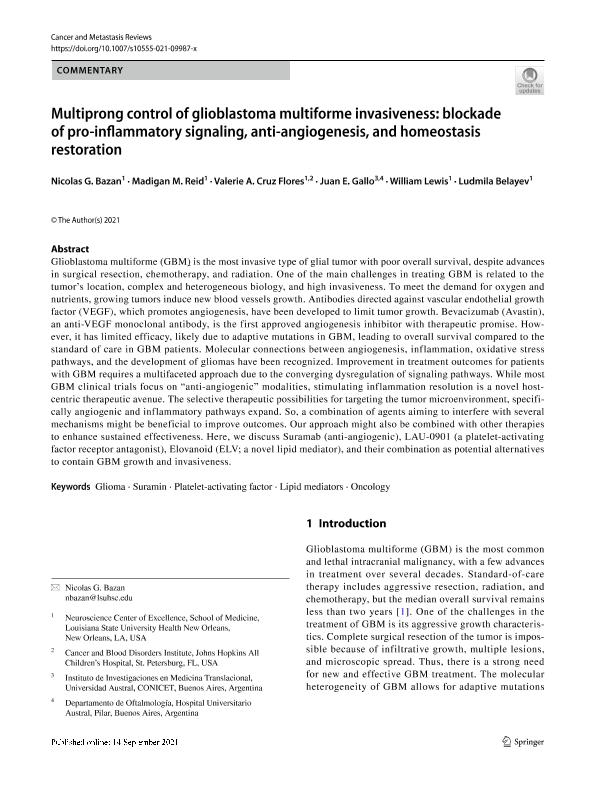Mostrar el registro sencillo del ítem
dc.contributor.author
Bazan, Nicolas G.
dc.contributor.author
Reid, Madigan M.
dc.contributor.author
Cruz Flores, Valerie A.
dc.contributor.author
Gallo, Juan Eduardo Maria

dc.contributor.author
Lewis, William
dc.contributor.author
Belayev, Ludmila
dc.date.available
2023-01-09T13:40:46Z
dc.date.issued
2021-09
dc.identifier.citation
Bazan, Nicolas G.; Reid, Madigan M.; Cruz Flores, Valerie A.; Gallo, Juan Eduardo Maria; Lewis, William; et al.; Multiprong control of glioblastoma multiforme invasiveness: blockade of pro-inflammatory signaling, anti-angiogenesis, and homeostasis restoration; Springer; Cancer And Metastasis Reviews; 40; 3; 9-2021; 643-647
dc.identifier.issn
0167-7659
dc.identifier.uri
http://hdl.handle.net/11336/183898
dc.description.abstract
Glioblastoma multiforme (GBM) is the most invasive type of glial tumor with poor overall survival, despite advances in surgical resection, chemotherapy, and radiation. One of the main challenges in treating GBM is related to the tumor’s location, complex and heterogeneous biology, and high invasiveness. To meet the demand for oxygen and nutrients, growing tumors induce new blood vessels growth. Antibodies directed against vascular endothelial growth factor (VEGF), which promotes angiogenesis, have been developed to limit tumor growth. Bevacizumab (Avastin), an anti-VEGF monoclonal antibody, is the first approved angiogenesis inhibitor with therapeutic promise. However, it has limited efficacy, likely due to adaptive mutations in GBM, leading to overall survival compared to the standard of care in GBM patients. Molecular connections between angiogenesis, inflammation, oxidative stress pathways, and the development of gliomas have been recognized. Improvement in treatment outcomes for patients with GBM requires a multifaceted approach due to the converging dysregulation of signaling pathways. While most GBM clinical trials focus on “anti-angiogenic” modalities, stimulating inflammation resolution is a novel host-centric therapeutic avenue. The selective therapeutic possibilities for targeting the tumor microenvironment, specifically angiogenic and inflammatory pathways expand. So, a combination of agents aiming to interfere with several mechanisms might be beneficial to improve outcomes. Our approach might also be combined with other therapies to enhance sustained effectiveness. Here, we discuss Suramab (anti-angiogenic), LAU-0901 (a platelet-activating factor receptor antagonist), Elovanoid (ELV; a novel lipid mediator), and their combination as potential alternatives to contain GBM growth and invasiveness.
dc.format
application/pdf
dc.language.iso
eng
dc.publisher
Springer

dc.rights
info:eu-repo/semantics/openAccess
dc.rights.uri
https://creativecommons.org/licenses/by-nc-sa/2.5/ar/
dc.subject
GLIOMA
dc.subject
LIPID MEDIATORS
dc.subject
ONCOLOGY
dc.subject
PLATELET-ACTIVATING FACTOR
dc.subject
SURAMIN
dc.subject.classification
Oncología

dc.subject.classification
Medicina Clínica

dc.subject.classification
CIENCIAS MÉDICAS Y DE LA SALUD

dc.subject.classification
Neurociencias

dc.subject.classification
Medicina Básica

dc.subject.classification
CIENCIAS MÉDICAS Y DE LA SALUD

dc.title
Multiprong control of glioblastoma multiforme invasiveness: blockade of pro-inflammatory signaling, anti-angiogenesis, and homeostasis restoration
dc.type
info:eu-repo/semantics/article
dc.type
info:ar-repo/semantics/artículo
dc.type
info:eu-repo/semantics/publishedVersion
dc.date.updated
2022-09-21T14:10:43Z
dc.journal.volume
40
dc.journal.number
3
dc.journal.pagination
643-647
dc.journal.pais
Alemania

dc.description.fil
Fil: Bazan, Nicolas G.. State University of Louisiana; Estados Unidos
dc.description.fil
Fil: Reid, Madigan M.. State University of Louisiana; Estados Unidos
dc.description.fil
Fil: Cruz Flores, Valerie A.. State University of Louisiana; Estados Unidos
dc.description.fil
Fil: Gallo, Juan Eduardo Maria. Universidad Austral. Facultad de Ciencias Biomédicas. Instituto de Investigaciones en Medicina Traslacional. Consejo Nacional de Investigaciones Científicas y Técnicas. Oficina de Coordinación Administrativa Parque Centenario. Instituto de Investigaciones en Medicina Traslacional; Argentina
dc.description.fil
Fil: Lewis, William. State University of Louisiana; Estados Unidos
dc.description.fil
Fil: Belayev, Ludmila. State University of Louisiana; Estados Unidos
dc.journal.title
Cancer And Metastasis Reviews

dc.relation.alternativeid
info:eu-repo/semantics/altIdentifier/doi/http://dx.doi.org/10.1007/s10555-021-09987-x
Archivos asociados
